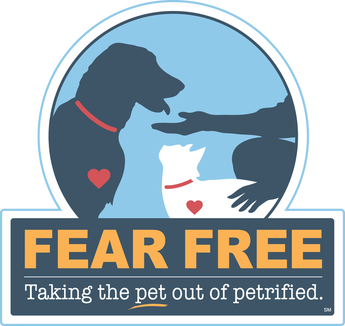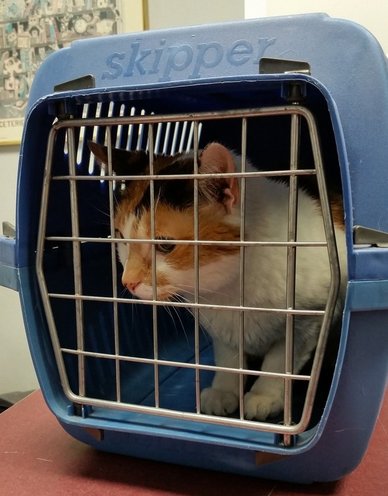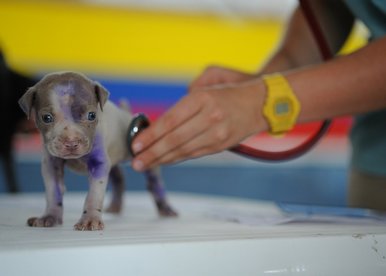|
by Dr. Kristin K. Burton-Hall, VMD  sIf you have visited GVVH recently you may have been surprised as we offered your pet peanut butter, cheese, canned chicken or canned food. This is part of a new certification we have achieved called Fear Free. Fear Free is an initiative developed by Dr. Marty Becker aimed at using gentle control techniques and calming environments in the veterinary hospital to make veterinary visit easier on the pet and owner. The Fear Free initiative involves much more than simply feeding your pet while he/she is here for an exam. Every member of our staff has completed nine hours of continuing education and training to become certified. Our goal is to make the visit as stress free as possible on your pet. We want them (and you!) to like coming to the veterinarian. Puppyhood and kittenhood are the most crucial times to begin your pet's veterinary health care in a fear free environment. We are striving toward more and more to use food, praise, petting and toys as a distraction from the unpleasant but necessary poking and prodding that we must do to them to keep them healthy. We are also trying to exam your pet in an setting that is less intimidating for him/her. Every pet is an individual and we may need a few tries to learn what works best. For cats this may mean removing the top of the carrier and letting him/her sit in the bottom for most of the exam. Some cats feel safer in a familiar area. For dogs this may mean doing most of the exam with him/her on the floor and only using the exam table briefly to obtain a body weight.  What you can do to help: For cats- Make the carrier a more pleasant place to be. Many owners make the mistake of keeping the carrier hidden away and only bring it out when the cat is going to come to the vet. The cat quickly learns to associate the carrier with a scary car ride and trip to the dreaded vet’s office. Leave the carrier out in your home, occasionally putting food and treats in the carrier as well as a comfortable blanket so that your kitty can go in and out of the carrier as he/she pleases. Practice putting kitty into the carrier closing the door and letting them right back out, then give a tasty treat such as canned food or tuna. This way on the day of your schedule visit it won’t be such a struggle to get your kitty into the carrier. When transporting the carrier do not use the handle. Carry it by the bottom as if you would as fragile gift. Carrying it by the handle, swings kitty causing increased movement and nausea. When placing the carrier in the car, put it on the floor of the backseat, behind the passenger seat, this will also decrease movement of the car moving and keep the car from sliding around on the seat or off the seat. This is the safest place for kitty should you have the extreme misfortune of being involved in an accident with kitty in the car. Keep the carrier covered with a towel and once in the veterinary clinic do not set the carrier of the floor. Cats like to be up high. Being on the floor provides too much frightening stimuli: stamping feet, grabbing hands, and sniffing noses of other pets in the clinic. Bring your kitty while they're hungry. Withhold food for 4-6 hours prior to the appointment. This will make your cat less likely to because nauseated and vomit on the way to the clinic and also make them more interested in any food we may offer during the appointment. Talk with us about any concerns you have; you know your feline friend better than anyone else. There are safe, mild sedatives available to help if you think your pet needs it. For some cats and their owners these are a life saver! For others the stress of trying to give the medication at home before the visit far outweighs any benefits. Some cats may be do worse if food is withheld prior to the appointment. Let us know what you think worked well or didn’t work well at his/her last appointment. The synthetic feline facial pheromone "Feliway" is very calming to some cats but not others. It is available in our clinic via diffuser in our exam rooms. You may also request a towel with Feliway prayed onto it to see if your pet could benefit from pheromones.  For Dogs- Bring your dog hungry. Similarly to our feline friends above, withholding food for 4-6 hours prior to the appointment will make your dog less likely to because nauseated and vomit on the way to the clinic. It can also make them more interested in any food we may offer during the appointment. Dogs tend to eat the tasty treats we offer much better for us than cats do. If your dog is not highly food motivated bringing his/her favorite toy can also be very helpful. We have several dogs who are very happy to hold their ball during their vet visits. Teach your pet to accept handling. This is especially helpful for your puppies. Work with your dog to get them to tolerate you opening his/her mouth, look at his/her ears, play with his/her feet all the while treating and rewarding your pet for tolerating and accepting the handling. There should not be any part of your pet’s body that you can not touch. This will make them much more accepting of the handling they must undergo at the hospital. Talk with us about any concerns you may have. Very stressed or nervous dogs can benefit greatly from having a sedative or anti-anxiety medication given at home prior to the appointment. Let us know if this is something you think your pet would benefit from. Also let us know what worked or didn’t work at the last appointment: Does he/she do better if the exam is done with them on the floor? Does a non-slip mat help? Does your pet do better if he/she waits in the car until we are ready? Our goal as always is to provide the best care possible this includes providing you and your pet as stress-free visit as possible. For more information visit the Fear Free website.
6 Comments
Ann Ryan
2/27/2017 03:52:44 pm
What a great approach. Mia always liked coming to your offices. The techs and treated her like there own dog.
Reply
Rabies is a disease that is transmitted from animals to humans caused by the rabies virus. The rabies virus is mainly transmitted through an animal’s saliva when the infected animals bite or scratch someone. Can you tell me that, how long does rabies vaccine last? Thanks you reading.....
Reply
Mark Henry
10/22/2022 12:18:06 pm
The most important periods to start your pet's veterinarian care in a fear-free atmosphere are when they are puppies or kittens. Get more info at PetCareRx.In order to keep them from the uncomfortable but necessary prodding and poking that we must do to keep them healthy, we are working harder and harder to utilise food, praise, stroking, and toys as a diversion. Additionally, we are attempting to examine your pet in a location that is less frightening for him or her.
Reply
5/11/2023 12:43:31 am
I look forward to hearing more news from you, thank you!
Reply
Leave a Reply. |
AuthorsDr. S. Dawn Dinger, DVM Archives
May 2017
Categories |
 RSS Feed
RSS Feed